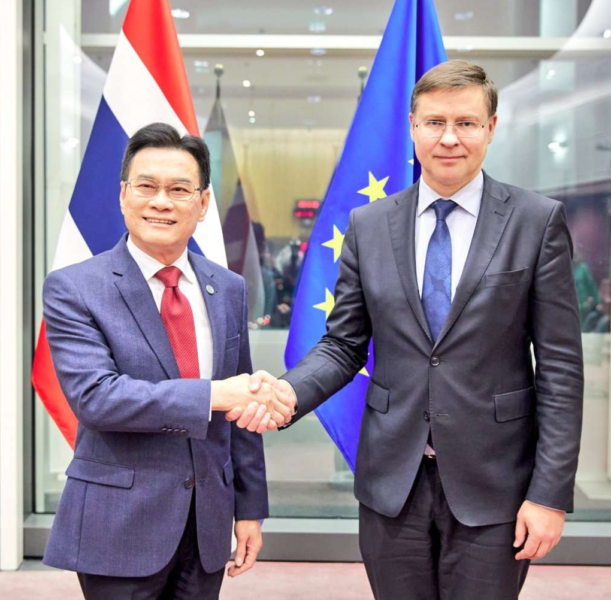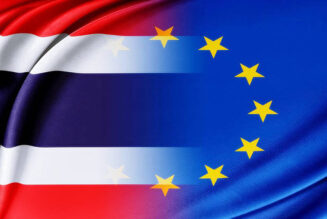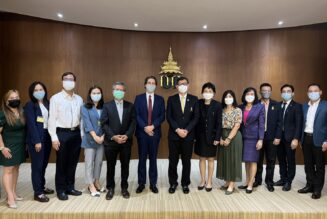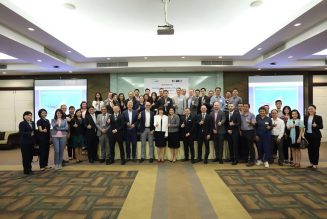Source: Tweet of Valdis Dombrovskis, @VDombrovskis, 26 January 2023
OPINION / BUSINESS SECTION
Dr. Ajaree Tavornmas
Partner, Access-Europe & Honorary Adviser, Thai-European Business Association (TEBA)
BANGKOK – As a free-trader, when I saw the picture of Thai Commerce Minister Jurin Laksanawisit meet with EU Trade Commissioner Valdis Dombrovskis in Brussels on the 25th of January 2023 to discuss potential resumption of the EU-Thailand Free-Trade Agreement (FTA), I started the New Year of the Rabbit with full of hopes for future of the EU-Thailand trade talks.
Then, EU Trade Commissioner Valdis Dombrovskis tweeted: “Glad to host Deputy PM Jurin to discuss possible relaunch of EU-Thailand trade talks. The news is good: both sides want a comprehensive, high- quality agreement, with ambitious sustainability provisions. We’ll now start consultations with a view to relaunching talks ASAP.”
The end of the Tweet was particularly appealing to me: ASAP. Because I believe that it is very timely now that both parties get serious and move forward the resumption of the EU-Thai FTA negotiations that has been on the table for many years. Most of the Thai and European businesses, at least ones I am acquainted with, are echoing the same messages in favour of the EU-Thailand FTA.
It has been almost a decade that we have heard about Thailand and the EU interests in negotiating this bilateral FTA. The official negotiation had started and then stopped in 2014 because of the political situation in Thailand. The resumption of the negotiations seems to be an interesting option for both sides, but why it has not yet moved ahead?
After the Council’s Conclusions in October 2019 that broadened the EU political engagement with Thailand (following the 2019 election) and stressed the importance of taking steps towards the resumption of negotiations with Thailand, the European Commission (DG Trade) and the Thai Ministry of Commerce have engaged in a mapping exercise since 2020 and both sides have done many researches and impact assessments to look into costs and benefits of this FTA. So, we are not starting this FTA with empty hands, but rather on a solid research ground. This important meeting between the two trade Ministers on the 25th of January 2023 signalled a political commitment and made a serious step to move forwards with the long-awaited resumption of the EU-Thailand FTA negotiations.
This development is certainly consistent with the current EU trade policy approaches to be open, sustainable, and assertive (Ref: The EU Trade Policy Review (2021) – An Open, Sustainable and Assertive Trade Policy) and the EU Indo-Pacific Strategy launched in 2022 in order to step up its strategic engagement with the vital Indo-Pacific region. Among ASEAN partners, the EU has already concluded FTAs with Singapore and Viet Nam for a couple of years back and all these FTAs are under implementation, and now making progress on negotiations with the Philippines and Indonesia. Talks with Malaysia are also in the radar. Other FTAs that the EU concluded with trading partners in the region are with South Korea, New Zealand, Japan, etc.
Added to this is a strong desire in the EU to continue its negotiations with many more important Asian and Indo-Pacific partners, i.e., Australia, India as well as with China (only on investment and only provided that China lifts the sanctions against Member of the European Parliaments) and one begins to see that the EU is picking its partners in Asia wisely. This trend towards more bilateral trade deals can only be expected to continue, especially in times of recession and a fragmented global economy. So, if Thailand is not ready to start negotiations soon, are we missing another train?
To the EU, this New Generation of FTA should be comprehensive and ambitious in both scope and content, aiming at substantial liberalisation of goods, services, investment and government procurement; elimination of Non-Tariff Barriers (NTBs) in many key sectors; modern regulatory provisions on TBT and SPS (beyond WTO); Intellectual Property Rights (IPR) disciplines; rules and commitments on Competition; Sustainable Development; Trade and environment and climate focused along with other social issues.
This is not new as the EU has been vigorously working on these issues for many years. And the regulatory frameworks, laws and regulations for accessing the European market is moving toward this open, sustainable, and assertive trade directions. Like it or not, these trends are here to stay.
The very valid question is whether it would be in the interests of Thailand to negotiate an FTA bilaterally with one of the world’s biggest economic powers, and one of the most advanced and comprehensive FTA? The answer to this question, at least to me, is that undoubtedly YES it will benefit Thailand – on the whole. A number of quantitative and qualitative studies show the economy-wide benefits of Thailand in such an FTA, albeit with important differentiation in sub-sectors of the Thai economy. It will help increase a level of competitiveness and fairness in Thai economy, improve and advance standards, especially of Thai SMEs, to the international level, and for sure better equipe Thai businesses, big and small, to be stronger and go globally.
In terms of investment benefits, such comprehensive FTA will provide strategic frameworks and principles for dialogue on trade and investment issues between the two parties to regularly and constructively consult on a wide range of issues. This process over the years will help improve Thailand’s business friendly environment and attract more Foreign Direct Investment (FDI) to the country – linking us in the regional and global supply chains.
And one should as well not underestimate the costs and lost opportunities when such an FTA has not yet kicked-off during the last years due to its delay. Moreover, if it will not happen in the coming years, there will be a loss of competitive advantages that can be gained as see in many of our ASEAN countries/competitors who have been enjoying these advantages for many years.
Thailand should not shy away from this commitment. Such an FTA will not only boost Thailand’s potential as a trade and investment partner of the EU, but will make our Thai business stronger and better equipped for a global economy. Most importantly, the EU-Thailand FTA will give Thai business a privilege partnership and access to the EU market of more than 450 million people.
I have always been a big fan of and wish for free-and-fair trade, a good level of playing field for businesses, and improved standards and competitiveness in this country as I believe they are instrumental tools to bring Thailand on the road to long-term prosperity, more secured and open economy, and of course better life standards for all. Perhaps many Thai citizens are sharing the same wishes. But this will require fundamental and structural changes in this country, economically, politically, and socio-culturally, and we need the right frameworks, tools, right people, and mind-set to do so.
————–
Dr. Ajaree Tavornmas is an EU- Thai independent consultant with over 20 years of academic and professional experience fully dedicated to international affairs and businesses, foreign and trade policy, and to enhancing the partnership between the EU and Thailand.
